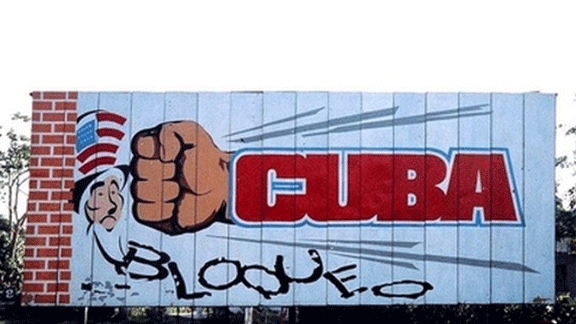Cuba a lesson in how US ‘fights terror’

The United States government claims to be waging “humanitarian” war against terrorism. But its real record is revealed by what it is doing to Cuba.
On 28 October, for the 23rd time, a resolution will be introduced into the United Nations General Assembly calling for an end to the half-century United States blockade of Cuba.
The resolution will be passed by a crushing majority, as it has been on 22 consecutive previous occasions. In recent years, aside from the US itself, the only guaranteed vote against is from Israel. Sometimes, a few small, aid-dependent governments will abstain (last year: Marshall Islands, Micronesia and Palau). On this issue, it really is the US thumbing its nose at the opinion of the rest of the world.
The US blockade aims to impoverish the Cuban people. As a small poor country, Cuba must import a large part of what it consumes, and pay with its exports. The blockade hampers both. Ships – of any country – that load or unload in Cuba are not allowed into US ports for six months; this doubles or triples the cost of many imports and raises the price of exports.
Most international trade is conducted in US dollars. Cuba is prevented from using them and so incurs extra costs for currency exchange. Even worse, the US has been stepping up its efforts to prevent banks anywhere in the world processing any transactions involving Cubans.
In its economic war against Cuba, the US regularly applies its own laws against foreign individuals and corporations. In July, the French bank BNP Paribas was fined US$8.97 billion by a US court for the “crime” of conducting transactions with Cuba, Sudan and Iran. Just how unlimited the US reach is was illustrated in January, when a German state bank refused to transfer 2,500 euros from a German Cuba solidarity group to a similar British group, because that would violate the US blockade.
As a pretext for the blockade, the US every year includes Cuba on its list of “states supporting terrorism”. This is particularly dishonest because, since 1959, there have been no acts of terrorism against the US launched from Cuba, but countless terrorist attacks have been launched from the US against Cuba.
Not counting the infamous US-organised Bay of Pigs invasion in 1961, since 1959, terrorist attacks on Cuba have killed at least 3,478 people and injured at least 2,099 others.
The most notorious anti-Cuba terrorist is Luis Posada Carriles. Posada, a CIA agent, was trained in the United States before engaging in numerous bombings and other terrorist activities in Latin America. A Panamanian court convicted him in absentia of responsibility for the world’s first terrorist bombing of a civilian airliner, which killed 78 Cubans in 1976. He was later jailed in Panama for plotting to assassinate Fidel Castro during the latter’s 2000 visit to that country, but then pardoned by the US-subservient president. Today Posada continues to walk free in the United States.
By contrast, in the 1990s, five Cubans infiltrated terrorist groups in Florida in order to stop their plots. Their information about the terrorists’ violations of US laws was provided to the US government in 1998, which promised to take action. Instead, it arrested the five and railroaded them into jail. Three of them are still in prison.
For the US government, “terrorism” is the refusal of poor countries to follow Washington’s orders.